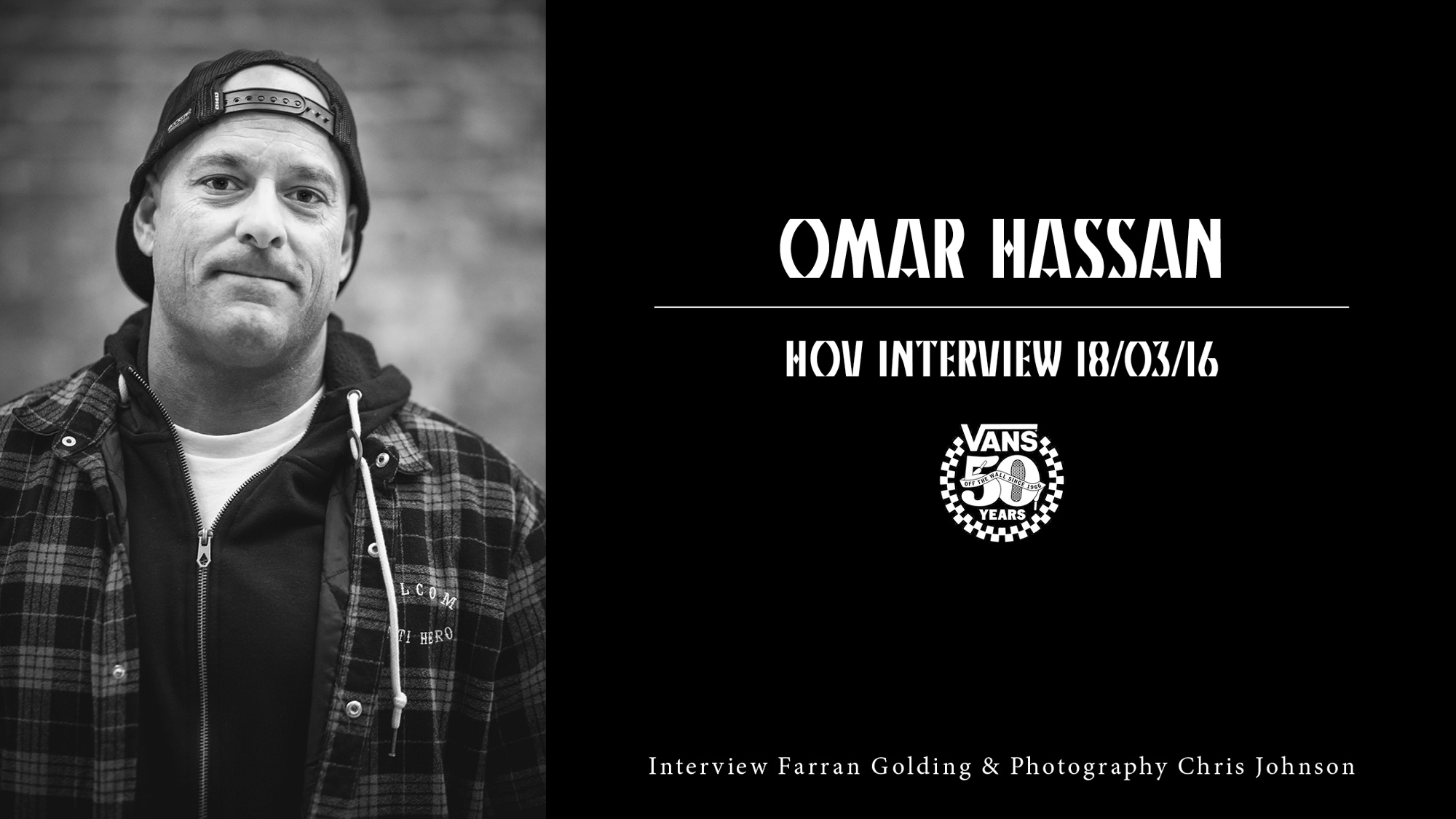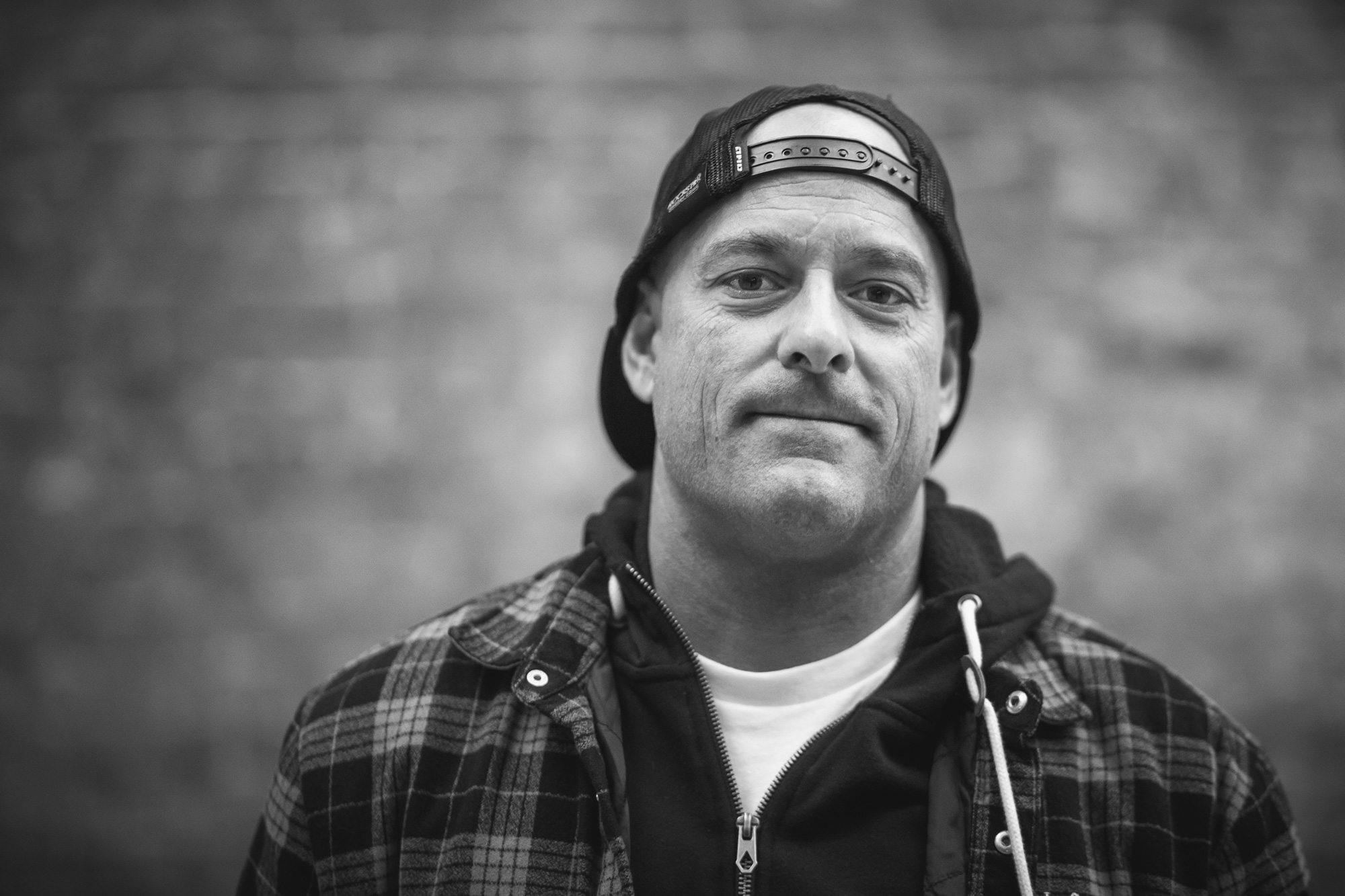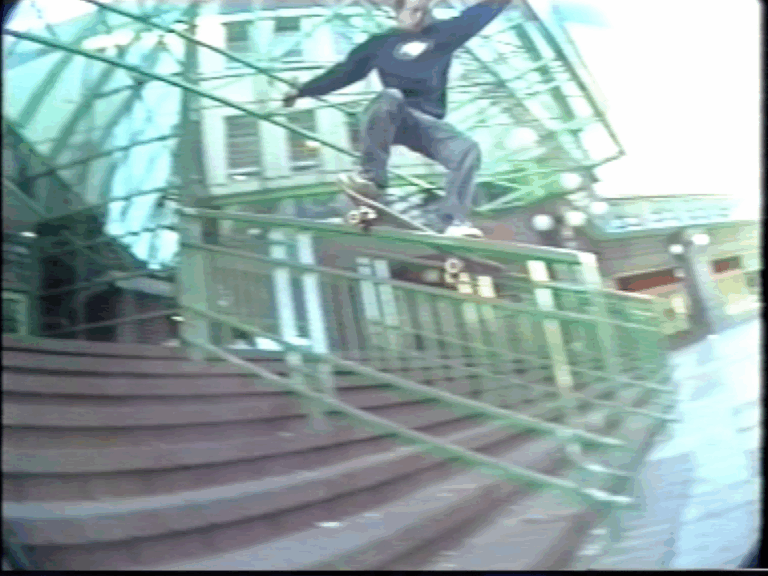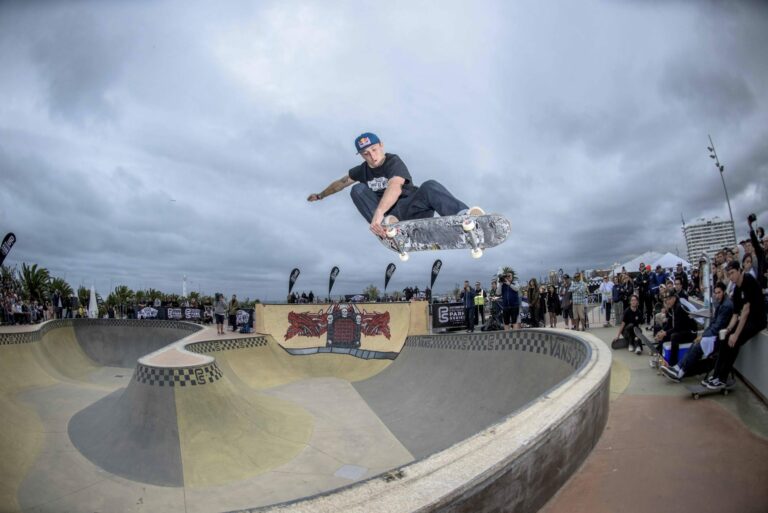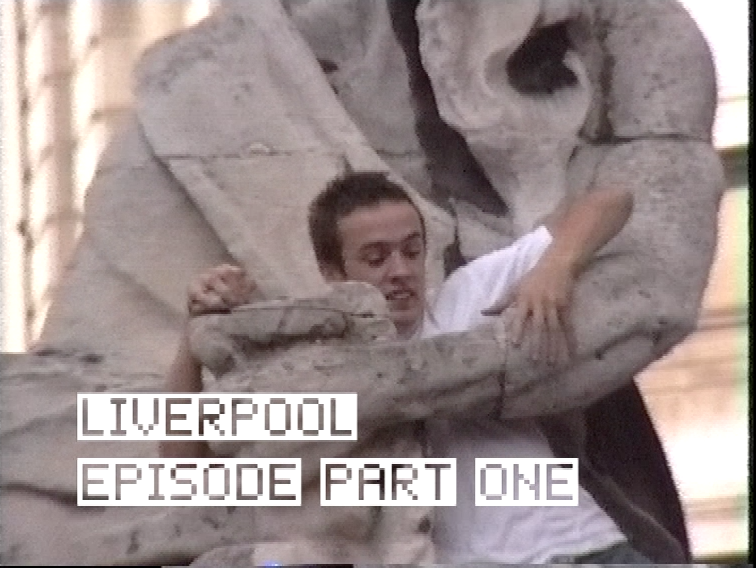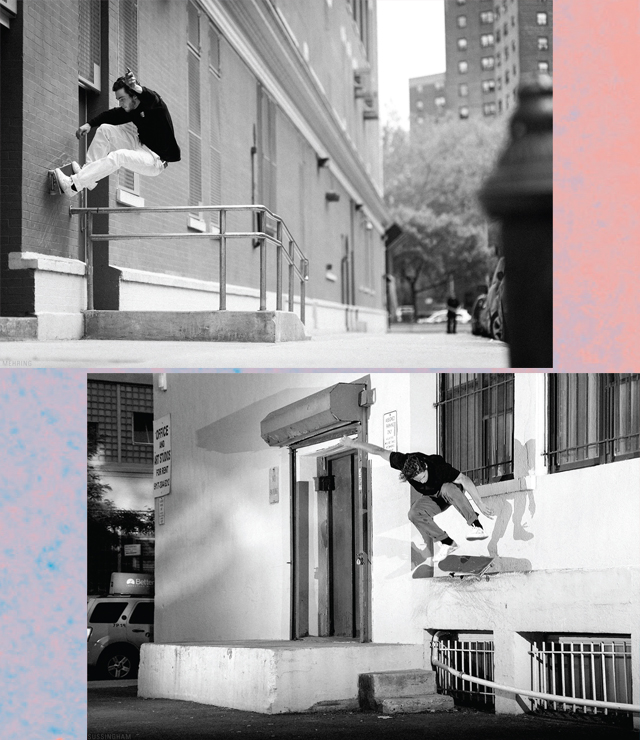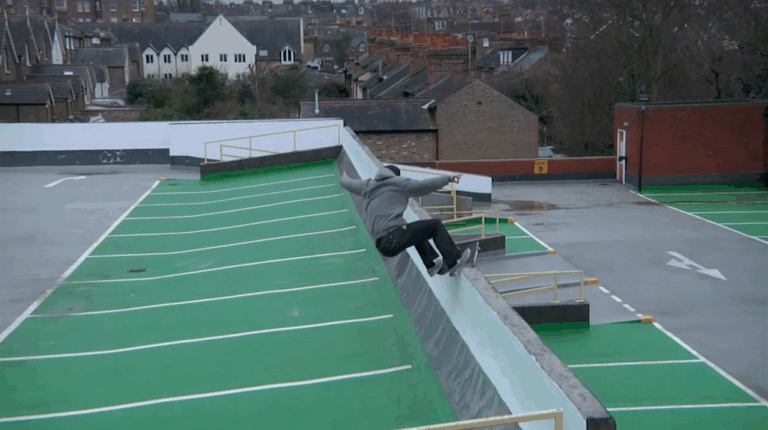You’re definitely right about it attracting more than just tranny skaters. I mean one of the first times I saw Dylan Rieder skate was footage from one of those comps and he’s pretty far removed from what you might be expect regarding people who would be down for that kind of an event.
Yeah, we used to actually go there with Dylan Rieder. We’re from the same town and I think Dylan learned how to skate tranny due to the fact we used to drag him to that event. He was like “Whoa!” and introduced to seeing that style of skating at Marseilles as something to focus his natural talent towards.
How was it hanging out with Gonz back in the day?
Mark Gonzales used to take me under his wing as a kid and I used to go stay at his house all the time. A funny story is he was supposed to go with me on this trip to Europe and I think he couldn’t find his passport on the day we were supposed to go. I was thirteen going to the Munster contest and ended up going with just the team manager in the end, which was really uncomfortable and anxiety inducing for me, (laughing). But at the same time it introduced me to all these pros who I’d never really got to see and through the years.
Mark really taught me what skateboarding was about, which was street skating and transition skating: it’s all just skateboarding and you do your own thing and that’s where I really got the idea of how to do what I do from.
Your first hook up was Vision and that was through Gonz, right? How did that come about?
I ended up just hanging out with him and Vision Skateboards was out of my local town and then the next thing you know Mark was giving me boards pretty much. I would get boards though Mark and it finally got to the point where I started meeting the right people at Vision and they just hooked me up directly. That’s where it all came from for me; just being a little grom in the right place at the right time.
Did you ever witness any of the major ‘firsts’ happening at that time in street skating like Mark’s 5050 down a handrail or Natas’ first wallride?
The first thing I remember seeing Mark doing that I’d never seen anyone do before was frontside boardslides on benches. There were these really cool fibreglass benches that they had down in Balboa Island in Newport Beach and I had seen him kind of figuring out how to board slide them. He was really good at transition but all he did was take all the tricks he wanted to do on transition and just start doing them on the streets, like a boneless off a curb cut and on and on from that. I got to watch his crazy mind turn street skating into pretty much transition skating on the streets. Then he started hitting rails and a lot of the spots you see in early videos of Mark were in my town, so it was pretty cool to be a part of that.
After Vision, your earliest video coverage was in Blockhead Skateboards videos, right?
Yeah I started riding for Blockhead and turned pro. One reason I liked Blockhead over the Vision thing was that Vision seemed to be much of a corporate, bigger company and at the time so many people were starting to branch off with H-Street and companies like that. I was really stoked to ride for Blockhead because it was something new and different and then guys like Rick Howard, Steve Berra and Jason Dill were riding for Blockhead too. After all this was going down we had this really insane team so I was stoked to be a part of that.
Was the Blockhead ramp as fun to skate as it looked?
The Blockhead ramp was really cool because it was something different; no one really was making wooden bowls at the time. What was cool was that Rick Howard lived there, pretty much at the ramp, because he was from Canada so he flew out and lived there. I got to spend a lot of time with a lot of cool people who would show up and then we’d just go street skating, or skate the Blockhead ramp, plus Tony Hawk had his ramp right up the street in Fallbrook, California so it was like skate haven. When you’re fifteen/sixteen and the owner was so cool letting us run amok, it was awesome.
As you just mentioned being on the same team as Dill back then and all these years later he’s on Vans with you; do you have any funny stories about Jason?
What’s funny is that Dill was a child prodigy. He was such a little ripper and he always had such a cool little personality. He’s one of those guys who definitely was a naturally talented skateboarder; it wasn’t hard for him to do it and he was always super creative. It’s funny because I still see him as that little guy now; you know what I mean? Even though he’s older and grown up now, I just remember being around him since he was so young so it’s cool to watch his whole program evolve.
You don’t really think of him as the chain smoking Supreme poster boy then, (laughs).
No, (laughs). I mean everyone chooses their deal and battle and stuff and I know Jason from back in the day so I’ll always know who he was back then and that’s instilled in my brain
Having dealt with some pretty heavy injuries over the years, how do you go about recovery and getting back to skating-strength?
I surf a lot and I feel like surfing really helps. It’s like my outlet. I don’t go to the gym and do all that shit because it’s just too much and it’s boring so I really like to get in the water. Surfing has helped me stay in shape a lot because you’re using way different muscles. It’s fun, you’re outside, you’re doing something; you’re not staring at a mirror on a treadmill with a bunch of weirdo’s so it’s awesome.
I get in the water even if I’m hurt; I’ll paddle around or whatever I can do. Being in the ocean is super therapeutic and where I live it’s like an ice bath sometimes. For the most part I’ve had a lot of injuries but I try to heal up as much as possible so I can get back on my skateboard because that’s my main priority and goal. You’ve just got to go through it because it’s part of skateboarding.
Which do you prefer; a kinked backyard pool or a perfectly flowing skatepark bowl? The former with no angry owners coming home, the latter with no hordes of scooter kids, so it has to be on the merits of the obstacle itself…
I mean they’re both relative nowadays. I like finding crusty, unmade skating spots because when you find fun stuff like that it’s a part of skating that’s cool. It’s kind of like street skating as well; you find a spot that’s awesome on the street; if you find a perfect spot that’s almost made for skating, but it’s not, that’s the best part of skating I think.
You’ve been part of Black Label for a long time now, how did that actually first come about?
Through John Lucero. I was on Acme, and Acme was at a weird time in skateboarding. Small wheels, big pants, a lot of Everslick… John’s from Huntington Beach and I’m from Newport Beach so ever since I’ve been a kid I had been around him and he was doing really well at the time so I begged and pleaded and got on, (laughs).
How has it been seeing so many changes with Black Label over the years?
It’s awesome, I think we’re doing our best right at this point. As far as how things have gone down, with like the whole F.A. thing, the smaller company movement and all that, it’s definitely nice to be part of something coming from a similar mindset. The whole motto from Label is ‘never be bought, never be sold’ and right now I think we’re in a position where we can do whatever we want and John has always had classic graphics. His artwork is some of the best and when you put those together it’s rad to be a part of that company and they’re doing good again which is great.
John mentioned in an interview not too long ago that the company is run entirely from his house, is that still true?
Yeah, I mean he’s doing it out of his garage but it’s a bigger scale than you would think. That’s the way he can control it and keep it cool; there are warehouses and employees and other places where he obviously has to source and store his stuff, but working out of your house and being at home is where you get more of your creative ideas, especially him being the artist that he is, it gives him the time to put out those really classic graphics that he does.
Getting back to what I said at the start about your history with Vans. What sort identity do you feel the older guys such as yourself, Rowley and AVE still going for it lends to the company?
Vans is obviously an older brand itself and it thrives on history and roots, so I think having those history and roots in skateboarding is really what has made Vans what is it. It’s like how Independent Trucks has been around forever and they really thrive off of, “Ride the best, fuck the rest.” and that’s kind of how Vans’ approach is too.
On the opposite side to that, what do you think the next generation like Gilbert Crockett, Kyle Walker and Rowan Zorilla bring to Vans?
They bring the youth and they’re the key and tools for the future and they’re all understanding and respectful of what Vans’ history is and they know that being part of that, they’ll be around for a while. And being a part of that means if you just keep doing your thing you’ll be put in that legendary category like a guy like Rowley, and Rowley has a done a lot for this brand. I think that those kids are the future and will keep that other side of Vans really strong as well.
To finish this off, all time favourite all time Vans rider?
Well, there’s been plenty in the past and will be in the future but I’m gonna say Mark Gonzales because he was on Vans before (laughs). You know, so… Erm, hold on, sorry…
[Jordan Thackeray (Vans UK rider) drops into the bowl and Omar appears transfixed, watching him tank around for a couple of minutes.]
(Laughs), what about still riding for Vans then?
That’s a hard one… I’d say Daan Van Der Linden because he’s one of my favourite people on earth right now and I love being around him and his energy. So, I would say Daan.

